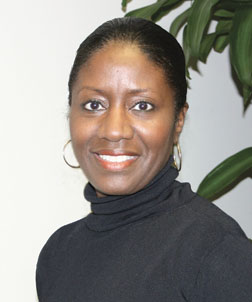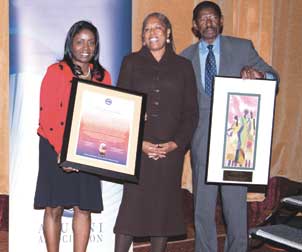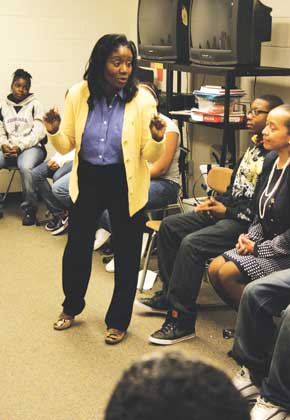Women's History Month Feature: AAAC President Linda Wharton Boyd Balances High Profile in D.C. and at Pitt
 Linda Wharton Boyd
Linda Wharton BoydLinda Wharton Boyd, president of the University of Pittsburgh’s African American Alumni Council (AAAC), has parlayed her doctoral degree in communication from Pitt into a career filled with high-profile executive positions.
Wharton Boyd (A&S ’72, ’75G, ‘79G) is the founder and chief operating officer of The Wharton Group, a family-owned-and-operated communications company in Washington, D.C., that serves government agencies and educational organizations. In January 2011, she took a leave from her company to become the director of communications for the new mayor of the District of Columbia. Wharton Boyd has also served as chief communications officer for the Washington, D.C., Public Schools, interim director of the D.C. Office of Cable Television and Telecommunications, and director of communications for the Human Services Agencies under the D.C. Deputy Mayor for Children and Youth, D.C. Department of Human Services.
Similarly, Wharton Boyd has taken a high profile on her alma mater’s Oakland campus; her dedication to Pitt is evident in the work she does on behalf of alumni and the University as a whole in her role as AAAC president.
“I was enriched as a Pitt undergraduate because I was able to immerse myself in a Pitt family,” said Wharton Boyd, who attended the University on a scholarship as one of the first Malcolm-Martin-Marcus (3M) scholars, part of a Pitt program, begun in 1968 to increase the enrollment of underrepresented groups at the University.
Wharton Boyd’s Pitt “family” included other 3M students and coordinators with whom she spent time when she was not attending class, studying, participating in the activities of the Delta Sigma Theta sorority, or teaching dance at the Selma Burke Art Center. Her love of dance led her to cofound the Pittsburgh Black Theater Dance Ensemble with the late Bob Johnson, a professor of dance in the former Black Studies department and a professional dancer from New York City.
 Wharton Boyd (left), stands with Gail Austin, former director of Pitt’s Academic Resource Center, and Ludwick “Luddy” Hayden Jr. (A&S ’66, EDUC ’68G), a former AAAC Distinguished African American Alumni Award winner and the president and founder of the consulting firm Luddy Hayden and Associates. Austin received the special Sankofa Jean Hamilton Walls Award during AAAC’s 2010 Sankofa Homecoming weekend.
Wharton Boyd (left), stands with Gail Austin, former director of Pitt’s Academic Resource Center, and Ludwick “Luddy” Hayden Jr. (A&S ’66, EDUC ’68G), a former AAAC Distinguished African American Alumni Award winner and the president and founder of the consulting firm Luddy Hayden and Associates. Austin received the special Sankofa Jean Hamilton Walls Award during AAAC’s 2010 Sankofa Homecoming weekend. Academically, Wharton Boyd also excelled. One of her mentors was Pitt Distinguished Service Professor of Communication Jack L. Daniel, a Pitt PhD graduate in 1969 and a leader of a group of African American Pitt students who occupied the University’s computer center on Jan. 15, 1969, calling for the University to increase the number of Black students, faculty, administrators, and staff at Pitt; to provide better academic support and resources for Black students; and to recognize the significance of African American life and culture on campus.
Daniel was eventually appointed interim director of Pitt’s newly created Black Studies Program. Wharton Boyd began her freshman year in the summer of 1969, and Daniel was her undergraduate advisor. Under his guidance, Wharton Boyd decided to enter Pitt’s PhD program in communication, forgoing a plan to attend law school.
About 10 years ago, in the thick of her demanding career, Wharton Boyd became involved in Pitt’s alumni efforts, beginning with Pitt’s Alumni Association. In 2005, she ran for and won the AAAC presidency.
Under Wharton Boyd’s leadership, the AAAC has made great strides, including a near tripling of AAAC-registered alumni. When she became president, the AAAC database had fewer than 6,000 alumni; it now has 16,000.
“With the advent of social media, we are able to reach more and more alumni,” Wharton Boyd noted. “AAAC’s programs to reconnect its alumni have had great importance to the success of our efforts as well.”
One such effort involves Pitt Chancellor Mark A. Nordenberg traveling to different cities to meet with Pitt’s AAAC alumni, called Chancellor Connections. About 300 alumni attended the AAAC event in Washington, D.C., in May 2007, and similar events were held in Atlanta and Pittsburgh in 2009. This year, AAAC alums in Philadelphia, New York, and Chicago will have the opportunity to meet the chancellor.
“Key to AAAC’s success is the partnerships we’ve formed with various entities at the University,” said Wharton Boyd. “I cannot say enough about Chancellor Nordenberg and his willingness and openness to support our efforts. It has been a true testament to our success, and his efforts have helped us in what we have done.”
 Linda Wharton Boyd talks with students at the Barack Obama International Studies Academy in East Liberty on Oct. 29, 2010. The event, which took place during the AAAC’s Sankofa Homecoming Weekend 2010, was part of AAAC’s annual Apple Seed program, where alumni mentor young students.
Linda Wharton Boyd talks with students at the Barack Obama International Studies Academy in East Liberty on Oct. 29, 2010. The event, which took place during the AAAC’s Sankofa Homecoming Weekend 2010, was part of AAAC’s annual Apple Seed program, where alumni mentor young students.In 2009, AAAC celebrated 40 years of diversity during Pitt’s annual Homecoming weekend and it launched its first major gifts campaign, a $3 million AAAC student financial assistance fundraising effort. About $2 million in gifts and pledges was raised in less than one year, prompting organizers to increase the goal to $5 million.
Each year, AAAC hosts a number of programs during its Sankofa Homecoming Weekend, including honoring alumni with the AAAC Distinguished Alumni Award and taking part in the Appleseed Program, in which alumni visit Pittsburgh schools to read to children and to talk about career and educational opportunities and life experiences.
In addition, AAAC is involved in helping new students get off on the right foot at Pitt. “Welcome Freshmen to Pitt” cookouts are held at the homes of AAAC alumni to offer new students from a given region opportunities to meet one another. The cookouts began in D.C. and the idea has spread to Baltimore, Atlanta, Pittsburgh, Philadelphia, and Cleveland.
As part of Pitt’s Arrival Survival activities for incoming freshmen and their families, AAAC holds a reception for families, said Wharton Boyd, who comes to Pittsburgh from D.C. to be a part of the festivities. “We have about 200 or 300 people attend. Programs like this help to alleviate the fears of students and parents.”
Wharton Boyd said she finds her AAAC volunteer work rewarding, and she believes it’s important to be involved, especially in student-support initiatives.
“Students need to have somebody that they can relate to, and it’s important to give them a good idea of what to expect,” she said. “Other African American alumni groups—[in Pitt’s schools of] pharmacy, engineering, medicine—are doing some of the things we’ve been doing to reach out to incoming students and their families. We’ve done trailblazing work at Pitt, and none of it could have been done without the support of Mark Nordenberg.”
Wharton Boyd’s advice for today’s African American undergraduates is to take advantage of every opportunity—she recalled her own travel to Kenya, Nigeria, Tanzania, and Zanzibar as an undergraduate.
When asked which of her accomplishments she was the most proud of, Wharton Boyd said she can’t single one out, but that her AAAC work has been extremely rewarding in a number of ways, among them “seeing the organization grow as quickly as it has, knowing that we are touching so many lives, and realizing that I have given a major part of my life to the University. What is life if you can’t give back? I tell students, ‘What I do for you, you should do for somebody else.’”
Other Stories From This Issue
On the Freedom Road

Follow a group of Pitt students on the Returning to the Roots of Civil Rights bus tour, a nine-day, 2,300-mile journey crisscrossing five states.
Day 1: The Awakening
Day 2: Deep Impressions
Day 3: Music, Montgomery, and More
Day 4: Looking Back, Looking Forward
Day 5: Learning to Remember
Day 6: The Mountaintop
Day 7: Slavery and Beyond
Day 8: Lessons to Bring Home
Day 9: Final Lessons

